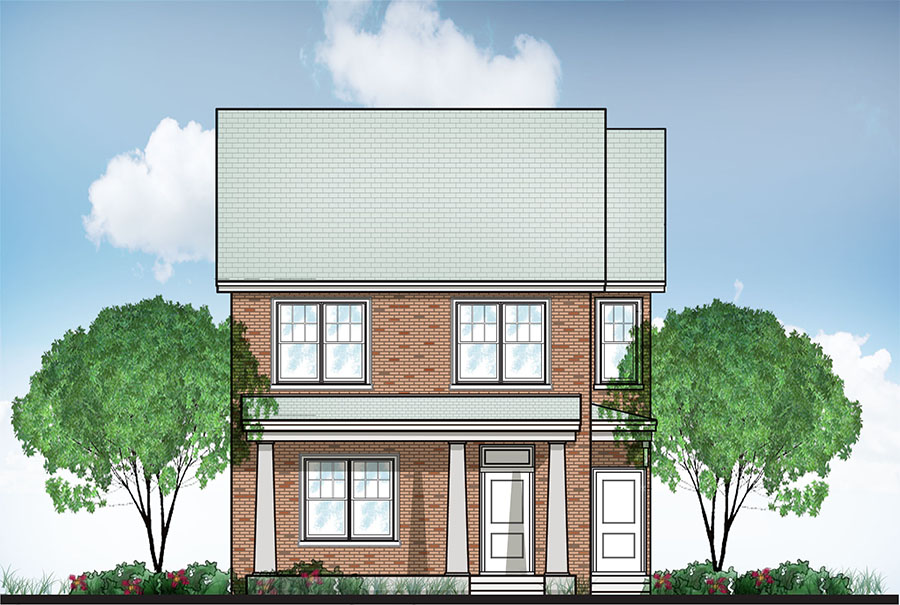Construction Begins for Dove Street Redevelopment
Employment Conference planned for RRHA residents, residents of the neighborhood surrounding the redevelopment area, and participants of Richmond’s Workforce Development Pipeline
Richmond, VA – July 2012– Richmond Redevelopment and Housing Authority (RRHA), Laurel Street Residential, the Master Developer for the Dove Street Redevelopment effort, and general contractor NorSouth Construction have started construction work for Phase I of the Dove Street Redevelopment effort.
Phase I of the Dove Street Redevelopment will consist of 80 affordable rental units to be located on the former Carrington Gardens-Northridge apartments site and the former Dove Court public housing site. The 80 units will be in 30 separate buildings designed to reflect and compliment the architecture of the adjacent Highland Park neighborhood.
All of the rental units in the new community will be privately managed. Admission criteria include a preference for households in which all adults are employed, in school, or in job training for at least 30 hours a week, with an exception for elderly and disabled persons. Prospective residents will have the opportunity to apply for Phase I units beginning fall 2012. The Phase I units are expected to be completed in spring 2013. Phase II of the redevelopment is expected to begin in early 2013.
“RRHA is delighted to take this symbolic first step in transforming Dove Street into a vibrant community of quality, affordable, mixed-income housing. This is a major step for our community members and the entire City of Richmond,” said Adrienne Goolsby, CEO at RRHA. “We are thankful for the support and collaboration of the City of Richmond, the Office of the Mayor, and the community at large. This redevelopment effort will increase educational, economic and overall quality of life opportunities for the Dove and surrounding communities. We are extremely excited about bringing this dynamic redevelopment effort to fruition.”
Richmond Mayor Dwight C. Jones added: “The Dove Street redevelopment, in my view, has the potential to spur the revitalization of North Highland Park and link this community to the surrounding neighborhoods of Green Park and Barton Heights. This is a comprehensive neighborhood transformation and the first major redevelopment of a former public housing site in the city of Richmond since 1997. I’m pleased we were able to help get this project moving. Additionally, what we will be able to learn from the Dove project will inform and help us with our overall efforts to transform the face of public housing in the city of Richmond.”
Supportive Services available to former Dove Court residents
RRHA has held two community meetings where former Dove Court residents were updated on the status of the Dove Street Redevelopment and provided with information on the abundance of RRHA supportive services available to help them meet eligibility criteria when applying for an apartment in the new community. RRHA’s Family Services and Community Relations Department and Housing Choice Voucher Program’s Family Self-Sufficiency program offers supportive services to former Dove Court residents in areas of employment, job training, educational advancement, family counseling, budget and credit counseling, and more. The City of Richmond’s Workforce Development Pipeline is also available to help residents prepare for, succeed in and sustain employment.
Employment and Business Opportunities
Construction jobs are expected to be created by the Dove Street Redevelopment effort. Hiring of very low to moderate-income City of Richmond residents to fill these jobs is a priority. Interested RRHA public housing residents and Housing Choice Voucher recipients who are not already enrolled with RRHA’s Section 3 employment training program should call (804) 780-4835 or visit the Calhoun Family Investment Center at 436 Calhoun Street in RRHA’s Gilpin community to fill out a questionnaire and a Section 3 application to start the enrollment process. Other interested persons should call the Richmond Workforce Pipeline at (804) 646-6464 to register and receive information on training resources and job opportunities. The Section 3 program is a provision of the U.S. Department of Housing and Urban Development (HUD) Act of 1968 that requires recipients of certain HUD financial assistance, to the greatest extent possible, to provide job training, employment, and contract opportunities for low or very low-income residents in connection with redevelopment activities and projects in their neighborhoods.
Creating contracting opportunities for local minority-owned businesses is also a priority of the project. Laurel Street Residential and its general contractor NorSouth held a Minority Business Enterprise subcontractor information workshop on Nov. 17, 2011. Site work, which represents approximately 20% of the project’s total costs, will be completed by a local minority-owned firm. Laurel Street Residential and NorSouth are working closely with the City of Richmond’s Office of Minority Business Development to identify and select additional local minority contractors to be added to the construction team.

